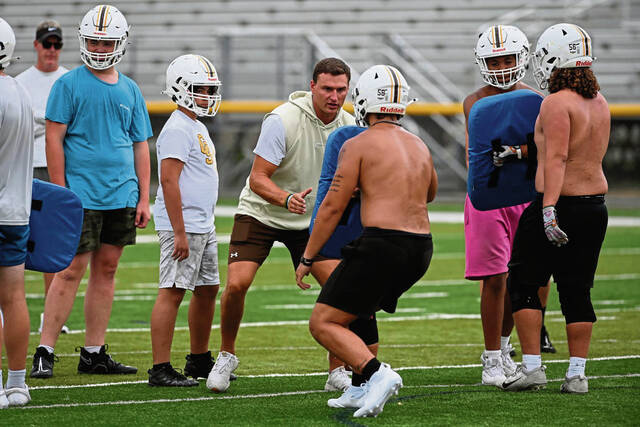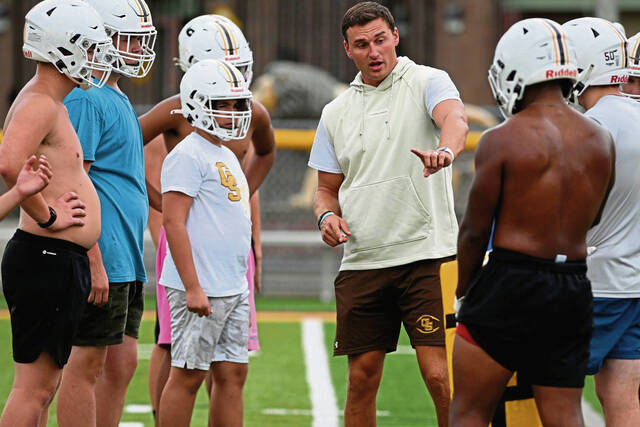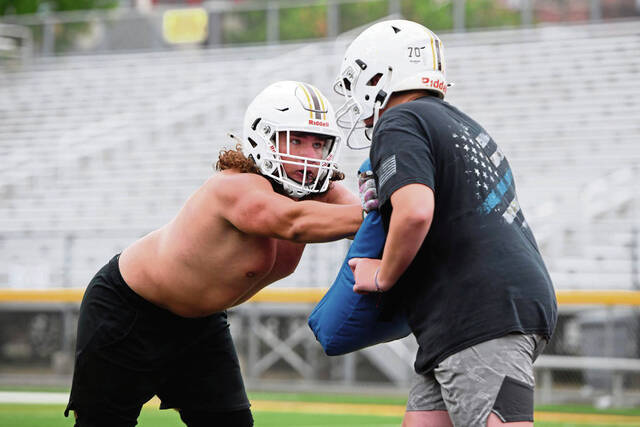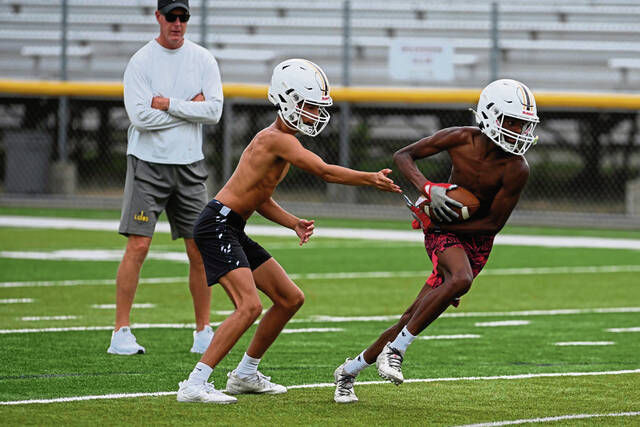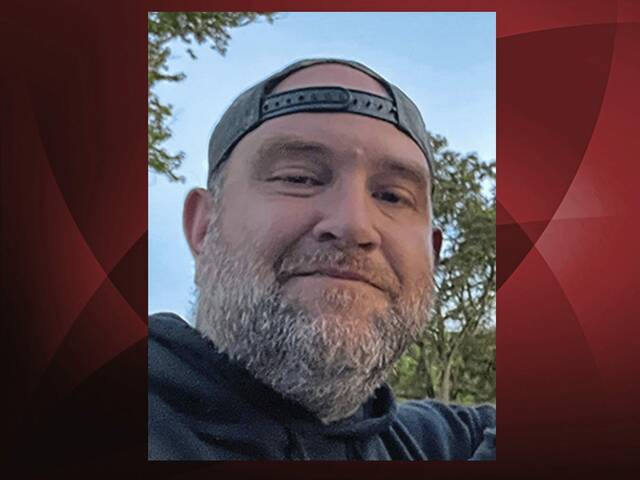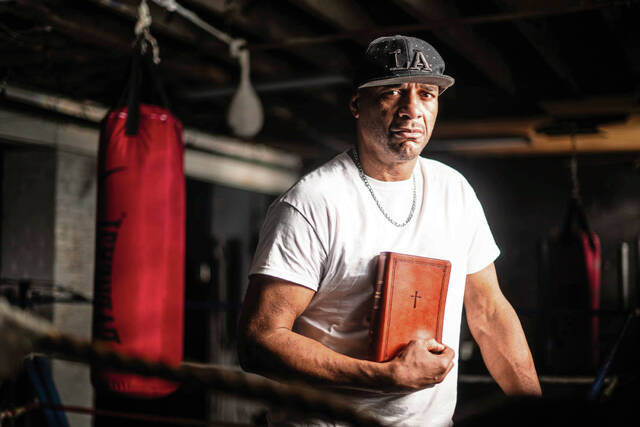Ryan Reitz is used to having difficult conversations.
For the past seven years, Reitz has facilitated the Coaching Boys Into Men program with male athletes in locker rooms across Westmoreland County — diving into topics such as consent, respect and dating violence.
Sometimes, encouraging athletes to participate in the conversations is like pulling teeth, he said.
“You’re talking about sexual misconduct and things with these kids, and then they’re talking about it aloud with their best friends next to them,” said Reitz, who facilitates the program on behalf of nonprofit Wesley Family Services. “That’s not exactly comfortable for a 16-year-old kid, but getting them to do that is a major win.”
Teams engaging in the program — which is geared toward high school and middle school boys — spend 12 weeks discussing the qualities of healthy relationships, mental health practices and violence prevention methods. Studies of the program’s efficacy have shown reduced incidents of dating abuse, sexual harassment and sexual assault among male athletes.
Athletes reached worldwide
Coaching Boys Into Men was launched in 2009 by Futures Without Violence, a nonprofit based in San Francisco that offers programs and advocates for policies to end violence against women and children across the world.
Since its founding, the program has reached 420,000 athletes and 12,300 coaches across all 50 states and more than 10 countries — including some sports teams at Derry Area, Greensburg Salem and Pittsburgh Central Catholic high schools.
UPMC physician and Pitt professor Elizabeth Miller played a pivotal role in shaping the program — completed by nearly 1,500 athletes and more than 70 coaches throughout Westmoreland, Allegheny, Fayette and Washington counties in the 2023-24 academic year.
“(Western Pennsylvania) really has touched a very, very large number — probably the (biggest) implementation of Coaching Boys Into Men in the country and, actually, around the world,” Miller said.
Miller connected with Futures Without Violence when she moved from Boston to Sacramento, Calif., in 2006. She has conducted research in sexual violence, intimate partner violence, and human trafficking prevention and interventions for 30 years.
Miller helped the nonprofit study the efficacy of the program among high school athletes in 2009 through funding from the Centers for Disease Control and Prevention.
One year after completing Coaching Boys Into Men, there were fewer incidents of sexual violence among athletes who participated, Miller said. Athletes also were more likely to intervene when they saw disrespectful or harmful behavior, she said.
Intervention plays a critical role in preventing dating abuse and sexual harassment, said Kristin Malone-Bodair, education and outreach program manager for the Blackburn Center.
“It’s really about (children) being aware of what’s going on,” she said. “When they see it occurring, how can they engage in a safe way to tell their peers, ‘Hey, this isn’t cool. This isn’t what we should be doing,’ and maybe stop dating abuse and sexual violence from occurring.”
By age 18, one in four girls and one in six boys have experienced sexual violence, according to 2015 data from the National Sexual Violence Resource Center.
That’s why it’s so important for schools to implement the Coaching Boys Into Men program early, Malone-Bodair said.
“If you start at middle school, you get a much higher percentage of students utilizing bystander intervention techniques,” she said.
A 2013 study of 41 middle schools in Western Pennsylvania noted a 90% reduction in dating violence and an increase in bystander intervention among athletes who completed the program, Miller said.
“We really wanted to encourage and use that team spirit of ‘Our entire team uses respectful language. Our entire team is working on stopping violence against women and girls,’ ” she said. “That sense of camaraderie on an athletic team, that might actually increase the likelihood that a young person would say something, do something, rather than being worried about being called a snitch.”
How it works
Coaches interested in completing Coaching Boys Into Men with their athletes are given a set of 12 discussion cards. Athletes gather before or after practice one day each week for a 15- to 20-minute conversation on a different topic — led by the coach or a facilitator, such as Reitz.
Card No. 4, for example, unpacks disrespectful behavior toward women and girls.
Greensburg Salem High School’s football team completed the program for the first time this spring. Head coach Ty George said the program encouraged his 50 athletes to discuss topics they might not feel comfortable bringing up at home.
“I would say they embraced it. I think it’s kind of like the elephant in the room. You’re going through high school, you’re going through these teen years,” he said. “There’s definitely some talking points you’d say would be uncomfortable, but those are the ones I would say you have to talk about.”
George played football at Hempfield Area High School and Seton Hill University. He wishes he had Coaching Boys Into Men when he was growing up.
“No matter what stage of life I was in, I think it would’ve been great to have,” he said.
The program brought the athletes closer together and improved team chemistry, he said.
“You have to work on being a team and respecting your teammates and communication,” George said. “I think those conversations about what it looks like to be a good teammate, those were things and messages that really went a long way.”
But the lessons the players learned also have shaped them off the field, senior Cooper Dann said.
“This program helps people realize that to become a better player, you have to become a better person,” said Dann, 17, of Greensburg.
Although it was uncomfortable at first, discussions about consent were important for the team.
“We talked a lot about consent. Not just with a relationship — with friends and everything,” he said. “We talked about how you should always ask for consent, but you should always look for an answer in someone, and if they’re slow to answer, almost assume (the answer is) no.”
Female programming
Futures Without Violence also has developed a program for female athletes, Miller said. It follows the framework of Coaching Boys Into Men but includes topics tailored to issues young women face every day.
“What we have found over the years is that coaches have used Coaching Boys Into Men for coed sports, and they’ve also used it with totally female-identifying athletes only,” Miller said. “So much of the content is really focused on challenging social norms around violence, social norms around sexual harassment, that everybody can benefit from the information.”
Coaching Female Athletes discusses gender stereotypes, women sexualized in the media and body image, Malone-Bodair said.
Like Coaching Boys Into Men, the female athlete program features a section on mental health, Miller said.
“Wouldn’t it be fabulous if we have a prevention program that addresses both reduction in violence as well as improving a young person’s mental health?” she said.
For Greensburg Salem senior football player Azreal Franklin, the mental health component was the most impactful part of the program.
The team learned about the importance of having a trusted friend or mentor to confide in when life challenges arise.
“It was basically anybody that you feel comfortable talking to,” said Franklin, 17, of Greensburg. “You could feel comfortable talking to a friend about certain things. There was emphasis that you can talk to the coaches and the people here helping us at the school.”
Setting aside time each week to engage in hard conversations and share vulnerably brought the team closer together, he said.
“I have hung out, personally, with a lot more members of the team and gotten to know them more, and I think we’re making a pretty good effort on doing that,” he said. “It’s working well, and it’s translating on the field.”
Franklin plans to continue playing football in college. He knows the lessons he learned from Coaching Boys Into Men will stick with him wherever his future takes him.
“It’s not just emphasis on one point in time — just in high school or just in college,” he said of the program. “These are things I’m always going to need to know, always going to be practicing.”


